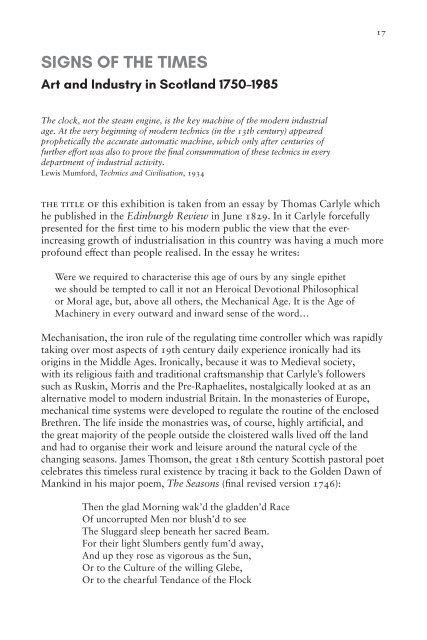Scottish Artists in Historical and Contemporary Context by Bill Hare sampler
Create successful ePaper yourself
Turn your PDF publications into a flip-book with our unique Google optimized e-Paper software.
17<br />
SIGNS OF THE TIMES<br />
Art <strong>and</strong> Industry <strong>in</strong> Scotl<strong>and</strong> 1750–1985<br />
The clock, not the steam eng<strong>in</strong>e, is the key mach<strong>in</strong>e of the modern <strong>in</strong>dustrial<br />
age. At the very beg<strong>in</strong>n<strong>in</strong>g of modern technics (<strong>in</strong> the 13th century) appeared<br />
prophetically the accurate automatic mach<strong>in</strong>e, which only after centuries of<br />
further effort was also to prove the f<strong>in</strong>al consummation of these technics <strong>in</strong> every<br />
department of <strong>in</strong>dustrial activity.<br />
Lewis Mumford, Technics <strong>and</strong> Civilisation, 1934<br />
The title of this exhibition is taken from an essay <strong>by</strong> Thomas Carlyle which<br />
he published <strong>in</strong> the Ed<strong>in</strong>burgh Review <strong>in</strong> June 1829. In it Carlyle forcefully<br />
presented for the first time to his modern public the view that the ever<strong>in</strong>creas<strong>in</strong>g<br />
growth of <strong>in</strong>dustrialisation <strong>in</strong> this country was hav<strong>in</strong>g a much more<br />
profound effect than people realised. In the essay he writes:<br />
Were we required to characterise this age of ours <strong>by</strong> any s<strong>in</strong>gle epithet<br />
we should be tempted to call it not an Heroical Devotional Philosophical<br />
or Moral age, but, above all others, the Mechanical Age. It is the Age of<br />
Mach<strong>in</strong>ery <strong>in</strong> every outward <strong>and</strong> <strong>in</strong>ward sense of the word…<br />
Mechanisation, the iron rule of the regulat<strong>in</strong>g time controller which was rapidly<br />
tak<strong>in</strong>g over most aspects of 19th century daily experience ironically had its<br />
orig<strong>in</strong>s <strong>in</strong> the Middle Ages. Ironically, because it was to Medieval society,<br />
with its religious faith <strong>and</strong> traditional craftsmanship that Carlyle’s followers<br />
such as Rusk<strong>in</strong>, Morris <strong>and</strong> the Pre-Raphaelites, nostalgically looked at as an<br />
alternative model to modern <strong>in</strong>dustrial Brita<strong>in</strong>. In the monasteries of Europe,<br />
mechanical time systems were developed to regulate the rout<strong>in</strong>e of the enclosed<br />
Brethren. The life <strong>in</strong>side the monastries was, of course, highly artificial, <strong>and</strong><br />
the great majority of the people outside the cloistered walls lived off the l<strong>and</strong><br />
<strong>and</strong> had to organise their work <strong>and</strong> leisure around the natural cycle of the<br />
chang<strong>in</strong>g seasons. James Thomson, the great 18th century <strong>Scottish</strong> pastoral poet<br />
celebrates this timeless rural existence <strong>by</strong> trac<strong>in</strong>g it back to the Golden Dawn of<br />
Mank<strong>in</strong>d <strong>in</strong> his major poem, The Seasons (f<strong>in</strong>al revised version 1746):<br />
Then the glad Morn<strong>in</strong>g wak’d the gladden’d Race<br />
Of uncorrupted Men nor blush’d to see<br />
The Sluggard sleep beneath her sacred Beam.<br />
For their light Slumbers gently fum’d away,<br />
And up they rose as vigorous as the Sun,<br />
Or to the Culture of the will<strong>in</strong>g Glebe,<br />
Or to the chearful Tendance of the Flock


















